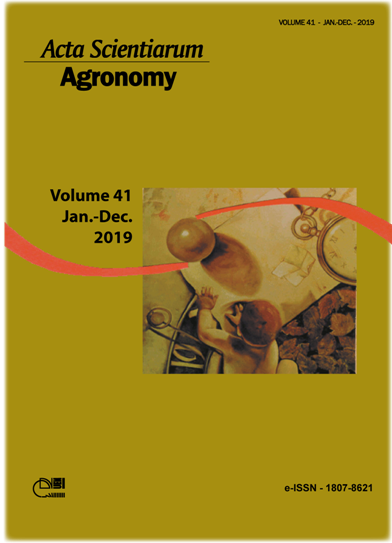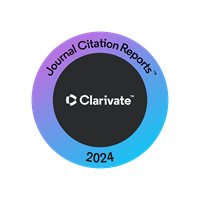Temporal evaluation of soil chemical attributes after slash-and-burn agriculture in the Western Brazilian Amazon
Resumo
In Amazonia, the main causes of deforestation are systems based on slash-and-burn agriculture. The objective of this work was to evaluate temporal changes in the soil chemical attributes after the vegetation has been slashed and burned in an area of native forest in the Western Amazon. For this study, four hectares of forest in Cruzeiro do Sul, State of Acre, Brazil, was slashed and burned. The soil in the study area was classified as Ultisol (Argissolo Amarelo Distrófico típico). Soil samples were collected over the course of one year, the first one being collected 16 hours after the burn and the others at 30, 60, 90, 150, 210, 270, and 360 days after the burn. The soil surface layers were more sensitive to fire action. Ashes from vegetation burn increased pH values, basic cations, and C values only in the first months, resulting in higher basal saturation values (V%). The practice of slash-and-burn after 12 months resulted in lower values of pH, Ca, Mg, K, and P and higher values of Al and H, as well as saturation by aluminum in the soil, indicating this practice contributes to the reduction of soil fertility.
Downloads
Referências
Anjos, L. H. C., & Pereira, M. G. (2014). Estado atual do conhecimento dos solos na região amazônica. In P. G. S. Wadt, A. L., Marcolan, S. C. G. Matoso, & M. G. Pereira (Ed.). Manejo dos solos e a sustentabilidade da produção agrícola na Amazônia Ocidental (p. 50-65). Porto Velho, RO: SBCS.
Araújo, E. A., Ker, J. C., Mendonça, E. S., Silva, I. R., & Oliveira, E. K. (2011). Impacto da conversão floresta - pastagem nos estoques e na dinâmica do carbono e substâncias húmicas do solo no bioma Amazônico. Acta Amazonica, 41(1), 103-114. DOI: 10.1590/S0044-59672011000100012
Bohn, H. L., Mcneal, B. L., & O’connor, G. A. (2001). Soil Chemistry (3rd ed.). New York, US: John Wiley & Sons.
Botschek, J., Ferraz, J., Jahnel, M., & Skowronek, A. (1996). Soil chemical properties of a toposequence under primary rain forest in the Itacoatiara vicinity (Amazonas, Brazil). Geoderma, 72(1), 19-32. DOI: 10.1016/0016-7061(96)00026-2
Braz, A. M. S., Fernandes, A. R., & Alleoni, L. R. F. (2013). Soil attributes after the conversion from forest to pasture in Amazon. Land Degradation & Development, 24(1), 33-38. DOI: 10.1002/ldr.1100
Brouwer L. C. (1996). Nutrient cycling in pristine and logged trop-ical rain forest: a study in Guyana. Tropenbos. Guyana series 1. Utrecht: Utrecht University, Elinkwijk.
Carvalho, J. A., Amaral, S. S., Costa, M. A. M., Soares Neto, T. G., Veras, C. A. G., Costa, F. S., …, Frade, E. F. (2016). CO2 and CO emission rates from three forest fire controlled experiments in Western Amazonia. Atmospheric Environment, 135(1), 73-83, 2016. DOI: 10.1016/j.atmosenv.2016.03.043
Cerri, C. C., Volkoff, B., & Eduardo, B. P. (1985). Deforestation effect on microbial biomass of a yellow latosol from Amazonic area, Brazil. Revista Brasileira de Ciência do Solo, 9(1), 1-4. DOI: 10.1590/S0044-59672012000100002
Couto, E. G., Klamt , E., & Stein, A. (2000). Estimation of exchangeable potassium and clay content in soils with scattered sampling in southern Mato Grosso, Brazil. Revista Brasileira de Ciência do Solo, 24(1), 129-140. DOI: 10.1590/S0100-06832000000100015
Davidson E. A., Verchot, L. V., Cattanio J. H., Ackerman I. L., & Carvalho J. E. M. (2000). Effects of soil water content on soil respiration in forests and cattle pastures of eastern Amazônia. Biogeochemistry, 48(1), 53-69. DOI: 10.1023/A:1006204113917
Davidson, E. A., Carvalho, C. J. R., Figueira, A. M., Ishida, F. Y., Ometto, J. P. H. B., Nardoto, G. B., ... Martinelli, L. A. (2007). Recuperation of nitrogen cycling in Amazonian forests following agricultural abandonment. Nature, 447(7147), 995-998. DOI: 10.1038/nature05900
Dias-Filho, M., Davidson, E. A. & Carvalho, C. (2001). Linking biogeochemical cycles to cattle. Pasture Management and Sustainability in the Amazon Basin. In McClain, M. E., Victoria, R. L., & Richey, J. E. (Ed.), The Biogeochemistry of the Amazon Basin (p. 84–105). New York, US: Oxford Univ. Press.
DeBano, L. F., Eberlein, G. E., & Dunn, P. H. (1979). Effects of burning on chaparral soils: I. Soil nitrogen. Soil Science Society of America Journal, 43(1), 504509. DOI: 10.2136/sssaj1979.03615995004300030015x
DeBell, D. S., & Ralston, C. W. (1970). Release of nitrogen by burning light forest fuels. Soil Science Society of America Proceedings, 34(6), 936938. DOI: 10.2136/sssaj1970.03615995003400060033x
Desjardins, T., Barros, E., Sarrazin, M., Girardin, C., & Mariotti, A. (2004). Effects of forest conversion to pasture on soil carbon content and dynamics in Brazilian Amazonia. Agriculture, Ecosystems & Environment, 103(2), 365-373. DOI: 10.1016/j.agee.2003.12.008.
Donagema G. K., Campos, D. V. B., Calderano, S. B., Teixeira, W. G., & Viana, J. H. (2011). Manual de métodos de análises de solos. Rio de Janeiro, RJ: Embrapa Solos.
Fearnside, P. M., & Barbosa, R. I. (1998). Soil carbon changes from conversion of forest to pasture in Brazilian Amazonia. Forest Ecology and Management, 108(1), 147-166. DOI: 10.1016/S0378-1127(98)00222-9
Fearnside, P. M. (2005). Deforestation in Brazilian Amazonia: History, rates, and consequences, Conservation Biology, 19(3), 680–688.
Ferreira, S. J. F., Luizão, F. J., Miranda, S. A. F., Silva, M. S. R., & Vital, A. R. T. (2006). Nutrientes na solução do solo em floresta de terra firme na Amazônia Central submetida a extração seletiva de madeira. Acta Amazônica, 36(1), 59-68. DOI: 10.1590/S0044-59672006000100008
Galang, M. A., Markewitz, D., & Morris, L. A. (2010). Soil phosphorus transformations under forest burning and laboratory heat treatments. Geoderma, 55(3-4), 401-408. DOI: 10.1016/j.geoderma.2009.12.02
Grier, C. C. (1975). Wildfire effects on nutrient distribution and leaching in a coniferous ecosystem. Canadian Journal of Forest Research, 5(4), 559607. DOI: 10.1139/x75-087
Holscher, D., Moller, R. F., Denich, M., & Folster, H. (1997). Nutrient imput-output budget of shifting agriculture in Eastern Amazônia. Nutrient Cycling in Agroecosystems, 47(1), 49-57. DOI: 10.1007/BF01985718.
Johnson, C. M., Vieira, I. C. G., Zarin, D. J., Frizano, J., & Johnson, A. H. (2001). Carbon and nutrient storage in primary and secondary forests in eastern Amazonia. Forest Ecology and Management, 147(2), 245-252. DOI: 10.1016/S0378-1127(00)00466-7
Kauffman, D., Cummings, D., & Ward, D. (1994). Relationships of fire, biomass and nutrient dynamics along vegetation gradient in the Brazilian Cerrado. Journal of Ecology, 82(3), 519-531. DOI: 10.2307/2261261
Kauffman, J. B., Cummings, D. L., & Ward, D. E. (1998). Fire in the Brazilian Amazon: 2. Biomass, nutrient pools, and losses in cattle pastures. Oecologia, 113(3), 415-427. DOI: 10.1007/s004420050394
Kauffman, J. B., Cummings, D. L., Ward, D. E., & Babbitt, R. (1995). Fire in the Brazilian Amazon: 1. Biomass, nutrient pools, and losses in slashed primary forest. Oecologia, 104(4), 397- 408. DOI: 10.1007/BF00341336
Korning, J., Thomsen, K., Dalsgaard, K., & Nørnberg, P. (1994). Characters of three Udults and their relevance to the composition and structure of virgin rain forest of Amazonian Equador. Geoderma, 63(2), 145–64. DOI: 10.1016/0016-7061(94)90003-5
Laurance, W. F., Cochrane, M. A., Bergen, S., Fearnside, P. M., Delamônica, P., Barber, C., D’Angelo, S., & Fernandes, T. (2001). The future of the Brazilian Amazon. Science, 291(5543), 438–439. DOI: 10.1126/science.291.5503.438
Longo, R. M., & Espíndola, C. R. (2000). Alterações em características químicas de solos da região Amazônica pela introdução de pastagens. Acta Amazônica, 30(1), 71-80. DOI: 10.1590/1809-43922000301080
Mackensen, J., Holscher, D., Klinge, R., & Folter, H. (1996). Nutrient transfer to the atmosphere by burning of debris in eastern Amazonia. Forest Ecology and Management, 86(1-3), 121-128. DOI: 10.1016/S0378-1127(96)03790-5
Markewitz, D., Davidson, E. A., Moutinho, P., & Nepstad, D. C. (2004). Nutrient loss and redistribution after forest clearing on a highly weathered soil in Amazonia. Ecological Applications, 14(4), 177–199. DOI: 10.1890/01-6016
McGrath, D., Comerford, N., & Duryea, M. (2000a). Litter dynamics and monthly fluctuations in soil phosphorus availability in an Amazonian agroforest. Forest Ecology and Management, 131(1-3), 167-184. DOI: 10.1016/S0378-1127(99)00207-8
McGrath, D., Duryea, M. L., Comerford, N. B., & Cropper, W. P. (2000b). Nitrogen and phosphorus cycling in an Amazonian agroforest nine years following forest conversion. Ecological Applications, 10(6), 1633-1647. DOI: 10.1890/1051-0761(2000)010[1633:NAPCIA]2.0.CO;2
McGrath, D. A., Smith, C. K., Gholz, H. L., & Oliveira, F. D. (2001). Effects of land-use change on soil nutrient dynamics in Amazonia. Ecosystems, 4(7), 625-645. DOI: 10.1007/s10021-001-0033-0
Medeiros, I. M. S., Lima, S. G., Maffi, B. A., Abadia, L. L., Martins, F. A., Dalamaria, T., & Ramalho, A. A. (2015). Inadequacies in good manufacturing practices and high health risks are still problems in food production in public preschools and daycares in Rio Branco, Acre, Western Brazilian Amazonia. Advances in Food Technology and Nutrition Sciences, SE(1), 38-46. DOI: 10.17140/AFTNSOJ-SE-1-106
Morton, D. C., Defries, R. S., Randerson, J. T., Giglio, L., Schroeder, W., & van der Werf, G. R. (2008). Agricultural intensification increases deforestation fire activity in Amazonia. Global Change Biology, 14(10), 2262-2275.
Numata, I., Soares, J. V., & Leonidas, F. C. (2002). Comparison of fertility of soils in Rondônia with different times of conversion of forest to pasture. Revista Brasileira de Ciência do Solo, 26(4), 949–955. DOI: 10.1590/S0100-06832002000400012
Orrutéa, A. G., Melo, V. F., Motta, A. C. V., & Lima, V. C. (2012) Mineralogia e reserva de K de Cambissolos submetidos a diferentes manejos após derrubada e queima da floresta na Amazônia Meridional. Acta Amazônica, 42(4), 461-70. DOI: 10.1590/S0044-59672012000400003
Pedroso Junior, N. N., Murrieta, R. S. S., & Adams, C. A. (2008). Agricultura de corte e queima: um sistema em transformação. B. M. P. E. G. Ciências Humanas, 3(2), 3-12. DOI: 10.1590/S1981-81222008000200003
Raison, R. J., Khanna, P. K., & Woods, P. V. (1985). Mechanisms of element transfer to the atmosphere during vegetation fires. Canadian Journal of Forest Research, 15(1), 132140. DOI: 10.1139/x85-022
Rheinheimer, D. S., Santos, J. C. P., Fernandes, V. B. B., Mafra, A. L., & Almeida, J. A. (2003). Modificações nos atributos químicos de solo sob campo nativo submetido à queima. Ciência Rural, 33(1), 49-55. DOI: 10.1590/S0103-84782003000100008
Sampaio, F. A. R., Fontes, L. E. F., Costa, L. M., & Jucksch, I. (2003). Nutrient and phytomass dynamics in a yellow argissol under amazonian tropical forest after burning and rice cultivation. Revista Brasileira de Ciência do Solo, 27(6), 1161- 1170. DOI: 10.1590/S0100-06832003000600020
Sanchez, P. A., Bandy, D. E., Villachica, J. H., & Nicholaides, J. J. (1982). Amazon Basin soils: management for continuous crop production. Science, 216(4548), 821-827. DOI: 10.1126/science.216.4548.821
Santos, H. G., Jacomine, P. K. T., Anjos, L. H. C., Oliveira, V. A., Lumbreras, J. F., Coelho, M. R., Almeida, J. A., Cunha, T. J. F., & Oliveira, J. B. (2013). Sistema brasileiro de classificação de solos. Brasília, DF: Embrapa Solos.
Seubert, C. E., Sanchez, P. A., & Valverde, C. (1977). Effect of land clearing methods on soil properties and crop performance in an Ultisol of the Amazon jungle of Peru. Tropical Agriculture, 54(4), 307-21.
Silva, G. R., Silva, M. L. Jr., & Melo, V. S. (2006). Effect of land use and management on chemical properties of a yellow latosol in Pará State, Brazil. Acta Amazonica, 36(2), 151-158. DOI: 10.1590/S0044-59672006000200004
Tedesco, M. J., Gianello, C., Bissani, C. A., Bohnen, H., & Volkweiss, S. J. (1995). Análise de solo, plantas e outros materiais. Porto Alegre, RS: UFRGS.
Vitousek, P. M. (1984). Litterfall, nutrient cycling, and nutrient limitations in tropical forests. Ecology, 65(1), 285-298. DOI: 10.2307/1939481
Yeomans, J. C., & Bremner, J. M. (1998). A rapid and precise method for routine determination of organic carbon in soil. Journal Communications in Soil Science and Plant Analysis, 19(13), 1467-1476. DOI: 10.1080/00103628809368027
Zarin, D. J., Davidson, E. A., Brondizio, E. S., Vieira, I. C. G., SÁ, T., Feldpausch, T., Schuur, E. A. G., … Denich, M. (2005). Legacy of fire slows carbon accumulation in Amazonian forest regrowth. Frontiers in Ecology and Environment, 3(7), 365-369. DOI: 10.1890/1540-9295(2005)003[0365:LOFSCA]2.0.CO;2
DECLARAÇÃO DE ORIGINALIDADE E DIREITOS AUTORAIS
Declaro que o presente artigo é original, não tendo sido submetido à publicação em qualquer outro periódico nacional ou internacional, quer seja em parte ou em sua totalidade.
Os direitos autorais pertencem exclusivamente aos autores. Os direitos de licenciamento utilizados pelo periódico é a licença Creative Commons Attribution 4.0 (CC BY 4.0): são permitidos o compartilhamento (cópia e distribuição do material em qualqer meio ou formato) e adaptação (remix, transformação e criação de material a partir do conteúdo assim licenciado para quaisquer fins, inclusive comerciais.
Recomenda-se a leitura desse link para maiores informações sobre o tema: fornecimento de créditos e referências de forma correta, entre outros detalhes cruciais para uso adequado do material licenciado.




















































